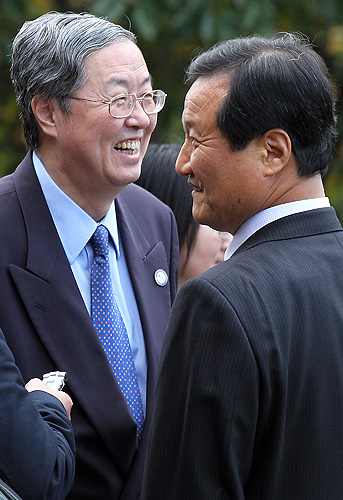|
 |
|
BIGGER CHINESE VOICE: Chinese central bank governor Zhou Xiaochuan (left) talks with South Korean Minister of Strategy and Finance Yoon Jeung Hyun during the G20 Finance Ministers and Central Bank Governors' Meeting in Gyeongju in October (XINHUA) |
The change would help improve the international economic order by increasing developing countries' IMF representation and create a just, equal and well-managed international monetary and financial system, he said.
Developed countries' advantages in the existing economic system would not change, though, as the reform didn't touch the basic framework and power distribution of the IMF, Shi said. Even though emerging economies gained more power through the reform, developed countries will still have the final say.
For example, the United States retains a voting right of about 17 percent. As the IMF stipulates important drafts may only be approved with a majority of 85 percent or greater, the U.S. vote is critical.
The world is currently developing multilaterally, and developing countries are playing a more and more important role in world economic recovery. "The IMF must accelerate reform to adapt to the new trends by adjusting its management and decision-making mechanisms," Shi said. As the largest developing country in the world, China is expected to increase cooperation with other emerging economies and developing countries to promote such a change, he said.
At the Gyeongju conference, G20 ministers also agreed to reshuffle the IMF's 24-member Executive Board, the IMF decision-making body. Two seats will shift from European countries to emerging economies and developing countries. European countries now hold nine board seats.
The agreement says all executive directors must be elected, rather than appointed as some are now, but the size of the board will be unchanged. Strauss-Kahn stated that the IMF's Executive Board would now be a "more democratic board."
The agreement reached in Gyeongju must still be approved by the board. According to the plan, the quota shift will be completed by January 2014, because the IMF needs to conduct a comprehensive review of its quota formula by January 2013. And the board change will also come along.
IMF Quotas
IMF quota subscriptions generate most of the IMF's financial resources. Each member country of the IMF is assigned a quota, based broadly on its relative size in the world economy. A member's quota determines its maximum financial commitment to the IMF and its voting power, and has a bearing on its access to IMF financing.
When a country joins the IMF, it is assigned an initial quota in the same range as the quotas of existing members that are broadly comparable in economic size and characteristics. The IMF uses a quota formula to guide the assessment of a member's relative position.
Quotas are denominated in Special Drawing Rights (SDRs), the IMF's unit of account. A member's quota delineates basic aspects of its financial and organizational relationship with the IMF, including:
—Subscriptions: A member's quota subscription determines the maximum amount of financial resources the member is obliged to provide to the IMF. A member must pay its subscription in full upon joining the fund: up to 25 percent must be paid in SDRs or widely accepted currencies (such as the U.S. dollar, the euro, the yen, or the pound sterling), while the rest is paid in the member's own currency.
—Voting power: The quota largely determines a member's voting power in IMF decisions. Each IMF member has 250 basic votes plus one additional vote for each SDR 100,000 of its quota.
—Access to financing: The amount of financing a member can obtain from the IMF is based on its quota. For example, under Stand-By and Extended Arrangements, a member can borrow up to 200 percent of its quota annually and 600 percent cumulatively. However, access may be higher in exceptional circumstances.
(Source: www.imf.org) | 